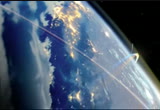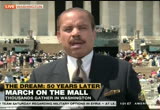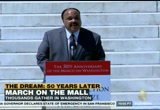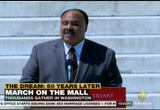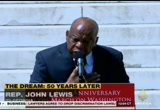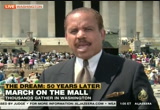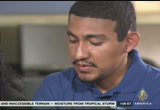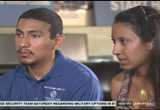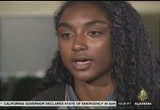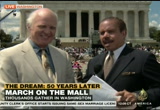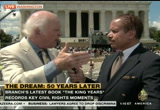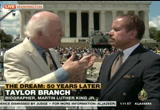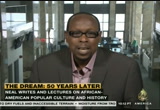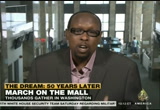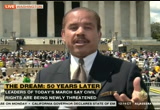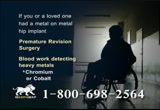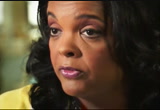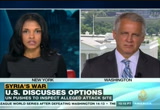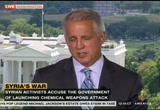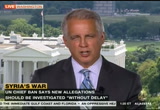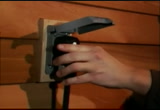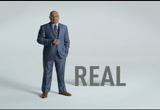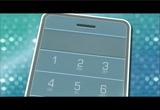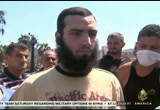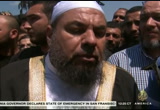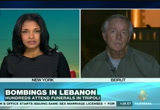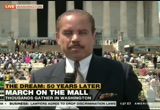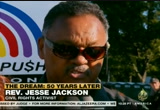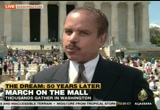tv News Al Jazeera August 24, 2013 1:00pm-1:31pm EDT
1:00 pm
>> i'm richelle caey. here is the latest from al jazeera. a group of doctors say signs point to chemical weapons used. wildfire spread into yosemite park and a new threat to san francisco. the march on washington, 50 years later people around the country reflect on martin luther king's dream. >> well to al jazeera, we're just days away from the 50th anniversary of that famous
1:01 pm
"i have a dream" speech. people are make thinking way to washington, d.c. thousands of people in fact, and our del walters is there talking to people about why it's so important for them to relive history, and how far have we come and how much further do we have to go? >> reporter: hey, richelle, what it is is a day of soaring temperatures and rhetoric on the mall much like it must have been 50 years ago. i watched it at home with my family as did hundreds of thousands african-americans or as we were called back then, negro or colored, and then blacks or african-americans. the crowds stretch from the lincoln memorial down to the moment. which is a distance of a mile. they started coming at 7:00 and they began to trickle to a sea of humanity that is now engaged in a familiar theme, and that is
1:02 pm
change has to come to washington. change has to come to america. that was the theme echoed some 50 years ago. one who spoke here today spoke 50 years ago, congressman john lewis. before he spoke they heard from a man who bears the name of a man whose day and speech we remember all too well. only he is is the third, martin luther king iii. >> 50 years ago he delivered a sermon on this mountain, which crystallized like never before the painful pilgrimage, and aching aspirations of africa americanses yearning to breathe free in our own homelands. but martin luther king's utterings of 1963 were not laments of past injustices or a
1:03 pm
diatribe of true injustices of the day. but it was a tribute to the tenacity of an intrepid people who reused to remain in bondage. they were a clarion call to all people of good will to rise up together, to make this nation listen out the true meaning of its creed, and to perfect within us a more perfect union. and so i stand here today in this sacred place in my father's footsteps. i am humbled by the heavy hand of history, but more than that i am--i, like you, continue to feel his presence. i, like you, continue to hear his voice crying out in the
1:04 pm
wilderness. the admonition is clear. this is not the time for nostalgic commemoration, nor is this the time for self congratulate tore celebration. the task is not done. the journey is not complete. we can and we must do more. >> reporter: now before he spoke we heard from congressman john lewis of georgia, perhaps best known as marching besides martin luther king during the freedom marchs. he being severely beaten during one of those marchs. what is interesting he was here during the first march and spoke during that first march. he had to tone down what it was that he said. he didn't do that today. >> back in 1963 we hadn't heard of the internet. we didn't have a cellular telephone, ipad, ipod, but
1:05 pm
we brought what we had to bring about a revolution. i say to all of you young people you must get out there and push and pull and make america what america should be for all of us! >> and we can think of standing your ground in the negative, but i ask you today to flip that coin and make stand your ground a positive ring for all of us who believe in freedom and justice and equality that we stand firm on the ground that we have already made, and be sure that nothing is taken away from us. >> reporter: now that wassed widow of medgar evans who was
1:06 pm
slain. i was of age of recognizin reckt not old enough to travel to the march. most people here are witnessing it for the first time. for a generation of americans martin luther king's "i dream a dream" was something that they would have to recite during back history month. they didn't know the march. they didn't know the movement. let's speak to those about what the speech means to them. >> i'm happy to join with you today and what will go down in history the greatest demonstration of freedom in our nation. >> reporter: the voices of tomorrow breathe new life in the transformative words of martin luther king. >> now is the time to raise our nation from the quick sand of injustice. >> reporter: these students at the boys and girls cub of santa
1:07 pm
monica. >> reporter: in your every day lives do you experience some of the things that dr. king was talking about in his speech with regard to oppression and inequality? >> i think that's it's still there, but it's not as prominent as it was before, but it's always there. >> reporter: when you say it's always there, the separation of races. >> the separation, you feel it when you're going in--what's the first question they ask
1:10 pm
ask. >> at the end of his 11 minutes and at the end of his conclusion it wasn't going over. it was pretty lame. it was written for mostly white america, and he made on a spur of the moment decision to ad-lib all of the last ten minutes which was over his limit. and the i dream a dream speech went over his limit. >> reporter: it was not popular some of the crowd. >> america had given black people a constitutionally promise that came back marked insufficient funds a bum check for freedom. that was the metaphor. some people liked that, but it didn't have any music. it didn't have any soaring to it. it was an accusation, but it was
1:11 pm
not a successful address. >> reporter: when i taught challengcollege i challenged mys to look at the speech. dr. king seemed to be shrinking in the podium during the first part of the speech. >> he's a gifted orator. he's reading signals about what worked. but it took a lot of nerve to go against his allotted time and ad-lib of the rest of the speech on his own. >> reporter: didn't he say, do the dream, martin. >> he said, tell them about the dream. it's not a refrain. it's part of a speech. it's like a musical riff if you're a musician. she had heard that in chicago. she said, tell him about the dream. give him one of your--give them some of your music, preach at
1:12 pm
them. that's what she was saying. now, he was too gifted of an orator to do anything on anybody's word. he made that decision himself, but we're all grateful that he did because this part of the speech was all ad-lib. >> reporter: you're listening to what the talented have to say about the speech of that day. if your take was whether or not this was a moment leading up to that moment or it was lightening striking and never to happen again. >> as he said, dr. king was an incredible orator. he understood what was at hand historically but also what was at hand at that particular moment where he needed to be able to move the crowd. he needed to riff the way.
1:13 pm
on that particular day in that pulpit, if you will, it takes advantage of that. >> reporter: looking forward now, are you convinced what we heard today, what we saw today will impact america tomorrow? >> you know, it's a different moment. i think when we see the march from 1963, it's something that hasn't happened to that extent before. that's why it remained indelibly marked in our cultural memory. as one of your speakers said earlier this is more of a microwave kind of moment, things happen, folks protest and they move on. ultimately what stains this moment are these kinds of social issues, whether the unemployment, whether issues with nsa, surveillance, incarceration of people of color, issues around gender and sexuality in this country. it's the issues that is going to sustain this moment, not this coming together.
1:14 pm
>> reporter: marc anthony neal, thank you for being with us today. to sum up what happened today and why it's so important and what happened 50 years ago is to think about a movement when people picked up the phone and started calling each over, the phone that was joined house by house by the line or going to church and hearing about it from the pulpit or going to work and talking in hushed tones because they were afraid their bosses might listen. and then daring to travel to the movement by bus, wondering if you returned home you would still have a job. that's how much america has changed. think about it, america. where there was no del walters because i was the first african-american on the airwaves in my hometown of wheeling, west virginia, that was the result of martin luther king's dream. >> basically, del, they paved the way for you, and you paved
1:15 pm
1:17 pm
opening doors ... opening possibilities. taking the impossible from lab ... to life. on techknow, our scientists bring you a sneak-peak of the future, and take you behind the scenes at our evolving world. techknow - ideas, invention, life. my name is jonathan betz. i'm from dallas, texas, and i'm an anchor for al jazeera america. >>my name is ranjani chakraborty, i'm from houston, texas. >>i'm kim bondy. >>nicole deford. >>and i'm from new orleans. >>san francisco, california. when i was a little kid, i just really loved the news. >>news was always important in my family. >>i knew as a kid that was exactly what i wanted to do. >>i learned to read by reading the newspaper with my great-grandfather every morning. >>and i love being able to tell other people stories. >>this is it, i want to be a part of this. >>this is what really drove me to al jazeera america.
1:18 pm
>> welcome back to al jazeera. you've been watching coverage of the 50th anniversary of the march in washington. to other stories. president obama is meeting with security advisers at the white house to discuss the u.s. response to alleged chemical weapons attack in syria. just this morning, a medical group with doctors without borders say they have streete td 1300 people from toxic poison. mike, these pictures, they're striking. every time you see them. the pictures of these victims, we're trying to get to the bottom of what happened. explain why this is different than so many other allegations that we've been hearing about time and time again? >> reporter: well, richelle, you
1:19 pm
just have to realize that al jazeera america, we deem some of these pictures unwatchable. they have that kind of impact around the world. the president's credibility is on the line. he put down that red line when he said that if chemical weapons were deployed it would cross a red line. there would be repercussions making an athlete against the assad regime. with all the reactions, it costs to much and causes resentment in the region. who are we helping, there are ae resistence who are unfriendly to the united states. germ dempsey is on record with opposing some of these options. these pictures may be that game changer. for the second time in three days the president's national security council is meeting, you
1:20 pm
noticed comings and goings. we believe it started a three arrests ago here--three hours ago here in washington, and no details of outcome yet. we do know secretary of defense chuck hagel, he spoke to reporters on his plane. he's giving steps towards options. we know they've redirected cruisers, cruisers that were scheduled to leave its tour of duty. the president has repeatedly emphasized this has got to be deliberate. there has to be an international aspect to this. the united states is not going to go alone. but if you look at the signs including the meetings, the repositioning of battleships and cruisers and the president yesterday in interview in the wake of these pictures you're asking me about, richelle,
1:21 pm
calling it a core national interest to make sure that assad does not deploy these chemical weapons, you have to wonder what the president is considering right now. they've taken off the table american boots on the ground. many have spoken against the practicality and efficacy of a no-fly zone. cruise missiles would appear to be the most logical choice. >> let us know what happens, thank you. on more to commonage on the other side the break, don't go anywhere.
1:24 pm
lebanon's city of tripoli after two bombings killed 47 people friday. we have this report from the scene. >> reporter: this is a city in mourning. dozens of victims of friday's deadly mosque bombings in tripoli were laid to rest, but the tempers sparked by their deaths have not been contained. lebanese politicians have been calling for restraint. very few are listening. gunmen brandish their weapons. it is a show of force. these men belong to lebanon's movement and tripoli is their stronghold. the mosques that were targeted are frequented by their supporters who have been backing the opposition in neighboring syria. >> we have a message to those responsible for these attacks. if you think this will silence us, it won't. this won't scare us. we will keep supporting the syrian rebels and stand by our brothers. >> reporter: the bombings were
1:25 pm
clearly intended to cause maximum casualties. there unprecedented security in this volatile city. the lebanese army has beefed up it's presence trying to keep this country together. but the lebanese armies are not the only force on the ground. gunmen are roaming the streets. they're setting up checkpoints and searching cars asking people for their identification papers. they say what they're looking for are their enemies. this is a city on the edge. there has been no claiming for the bombings, but people here.
1:26 pm
1:27 pm
1:28 pm
>> sometimes it's important to look back on days like today to see what america was like. we were a segregated society. we were a society that did not allow people to drink from the same drinking foundation sit at the same lunch counters or sit on the same buses. i spoke to many about how much change america has seen. >> racism now is in vicious ways, but the language of politicians, for example, we need now to--we need the constitutional right to vote. we can't let voting rights go back to states rights again.
1:29 pm
we need the constitutional right to vote. we need bring the war on poverty. we have war on education. young people with good minds are unable to go to school. and time for reconstruction of urban america where homes have been foreclosed by banks. we have bailed out banks but not the victims of bank behavior. it's not so much about motivation but legislation and appropriation. [♪ music ] >> reporter: so why are we here? we're here because of one man on one day on one speech in a moment in time that shall never ever be repeated again. that man being the reverend martin luther king in his famous "i have a dream" speech. >> i have a dream that one day this nation will rise up, live out the true meaning of its
116 Views
Uploaded by TV Archive on

 Live Music Archive
Live Music Archive Librivox Free Audio
Librivox Free Audio Metropolitan Museum
Metropolitan Museum Cleveland Museum of Art
Cleveland Museum of Art Internet Arcade
Internet Arcade Console Living Room
Console Living Room Books to Borrow
Books to Borrow Open Library
Open Library TV News
TV News Understanding 9/11
Understanding 9/11
